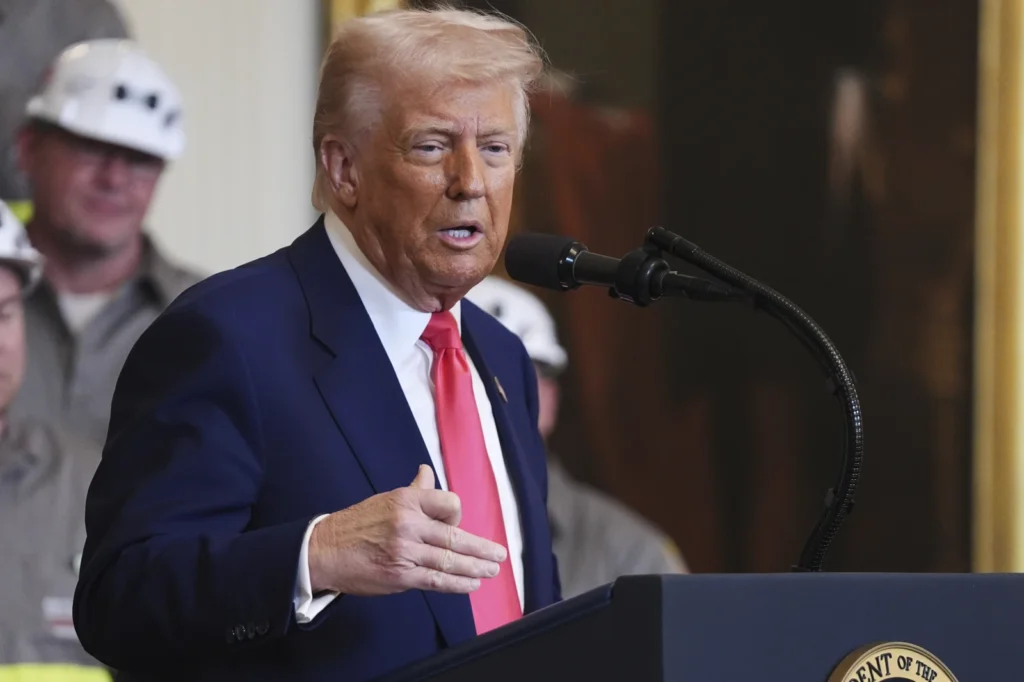President Donald Trump has announced a sweeping 90-day suspension of most tariffs on U.S. trading partners while simultaneously escalating import taxes on Chinese goods to an unprecedented 125%. The unexpected policy shift, confirmed Wednesday, marks a dramatic recalibration of the administration’s trade strategy, refocusing what had been a global trade dispute into a targeted economic offensive against China.

The announcement caused a sharp reaction in global financial markets. While U.S. indexes rallied in response to the easing of trade tensions, major markets across Europe and Asia experienced steep losses, having closed before Trump’s updated policy was made public. London’s FTSE 100 fell by 2.9%, Tokyo’s Nikkei 225 declined 3.9%, and the CAC 40 in Paris dropped 3.3%. In contrast, Chinese equities posted gains, with the Hang Seng Index in Hong Kong rising 0.7% and the Shanghai Composite climbing 1.3%.
Speaking at a casual press event with racing champions on the White House driveway, Trump explained his decision by pointing to signs of volatility in financial markets. He said he had been closely watching market behavior in recent days and noticed a growing sense of anxiety, particularly in the bond market. “It looked pretty glum,” Trump said. “People were getting a little queasy. The bond market right now is beautiful.”
According to Trump, this unease pushed him to reevaluate his tariff stance. He emphasized that while some critics had become “yippy” and “afraid,” he believed the U.S. could no longer sustain the economic relationships that had previously gone unchallenged. “Somebody had to pull the trigger. I was willing to pull the trigger,” he stated, defending his original decision to introduce tariffs that sent shockwaves through the global economy.
In a statement posted to his social platform Truth Social, Trump said his decision to pause many tariffs was a calculated response to how other countries reacted—or didn’t. “Because so many countries had not retaliated against our latest crank higher in tariffs, I have authorized a 90-day PAUSE, and a substantially lowered Reciprocal Tariff during this period, of 10%, also effective immediately. Thank you for your attention to this matter!” Trump wrote.
Treasury Secretary Scott Bessent provided further clarification, noting that while Trump had paused the so-called “reciprocal tariffs” on most of the country’s top trading partners, a 10% baseline import tax on nearly all global goods would remain in effect. Bessent did not provide a detailed breakdown of which countries or products were exempt from the pause.
The most significant shift, however, is the dramatic increase in tariffs on Chinese imports. Trump confirmed that all goods entering the U.S. from China would now be subject to a 125% import tax, effective immediately. The steep hike reinforces the administration’s long-standing position that Beijing engages in unfair trade practices and intellectual property theft.
When asked how he would handle exemptions for businesses that have been disproportionately affected by the tariffs, Trump said those decisions would be made on a case-by-case basis, guided more by instinct than by formal analysis. “You almost can’t take a pencil to paper,” he remarked. “It’s really more of an instinct.”
The broader implications of Trump’s tariff shift are still unfolding. Analysts see the move as an effort to isolate China while alleviating pressure on U.S. allies and domestic markets. However, critics warn that raising taxes on Chinese imports to such a degree could provoke retaliatory action from Beijing, potentially igniting a more intense and narrowly focused trade conflict.
In the meantime, business leaders and global investors are closely watching for further guidance from the White House on how the 90-day pause will be implemented and what may come next. Trump has not ruled out the possibility of reinstating or expanding tariffs once the temporary window expires, especially if other nations do not offer what he deems fair trade concessions.
With the 2025 election cycle heating up, Trump’s recalibrated tariff policy is likely to become a central issue in the national debate over trade, economics, and America’s role in the global marketplace.



